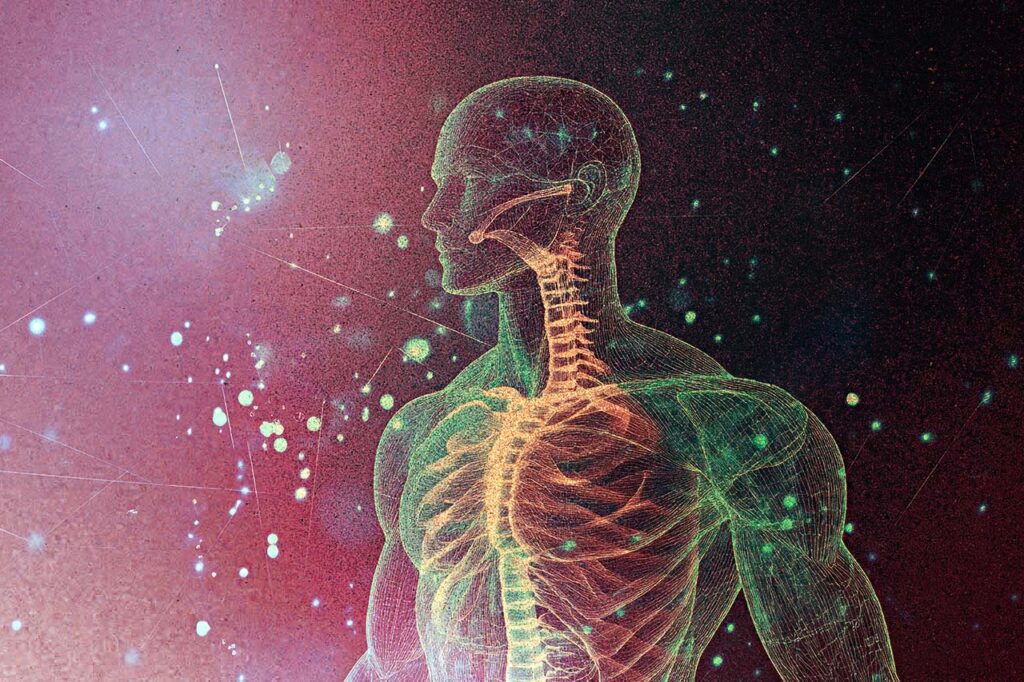Artificial intelligence and healthcare: a successful hybridization
On September 25, 2025, the University of Montpellier brought together the academic community and its partners for a day dedicated to the theme "AI and health, global health in the age of AI." The goal was to explore advances, challenges, experimental frameworks, and concrete solutions in training, research, and innovation. This exploration is already well underway in Montpellier, as evidenced by the many projects combining AI and health.

Several hundred people gathered on September 25 at the Institute of Botany to explore the close links between AI and health, which have long existed in Montpellier. Indeed, there has always been a strong desire to work together in Montpellier between AI and health, and if the University of Montpellier is now at the forefront of these fields, it is because they have since become intertwined.
Long tradition
In the field of research, this long tradition of interdisciplinary hybridization between digital technology and health has already been put into practice in numerous projects, as evidenced, for example, by the long-term thematic project "Understanding and acting for living organisms,"which aims to amplify collaborations and synergies within the MIPS cluster through the study of living systems, both in fundamental and technological research, in relation to issues in biology, health, agronomy, ecology, and environmental sciences.
At Lirmm, artificial intelligence and healthcare also interact in the field of medical robotics, with the Tirrex platform, a technological infrastructure for excellence in robotics research, where AI plays a key role in proposing new developments for existing medical devices as well as new intelligent technological solutions for the surgery of tomorrow.
At the IRCM, researcher Stéphanie Nougaret is using AI to "digitize" cancer through a research project she is developing to implement a new approach to visualizing cancerous lesions through imaging, which has earned her the prestigious Starting Grant from the European Research Council.
Broad spectrum
The topics covered in AI and health in UM research units cover a broad spectrum. At IDESP, for example, the Inria Prémédical project team is made up of researchers in statistics, machine learning, and AI, as well as clinicians. These diverse profiles specialize in the development of precision medicine methods through causal learning and federated learning, which, among other things, ensures the confidentiality of medical data. This research aims to accelerate the availability of targeted drugs on the market and deploy decision support algorithms.
The healthcare sector is facing an ever-increasing amount of medical data, and healthcare professionals are becoming increasingly dependent on the quality of the design and configuration of digital tools in their practice. To cope with this mass of data, in 2022 the UM, the CHU, and the company Dedalus launched a project led by the ISDM for the UM and by Erios (Research and Integration Space for Digital Health Tools) at the CHU.
High-performance analytics
AI enables major innovations in healthcare, particularly in the field of personalized medicine, which requires understanding the specific characteristics of diseases in order to better treat patients by deciphering the thousands of mutations that dot our DNA sequences. This is the breeding ground for the start-up SeqOne Genomics, co-financed by the UM, which offers high-performance genomic data analysis solutions for personalized medicine, with the aim of improving clinical care for patients with cancer and rare and hereditary diseases.
While this research highlights the links between AI and healthcare, these links are also strong in education, as demonstrated, for example, by the decision to establish a UM junior professorship (CPJ) in artificial intelligence within the PhyMedExp laboratory. Zubeyir Salis, holder of this CPJ, has helped to create a new dedicated course for this year for medical and midwifery students at the Montpellier-Nîmes Faculty of Medicine, which is structured around two teaching units of 12 hours each.
Better-educated students
Generative AI is also used to train and assess medical students' skills with the Doc Simulator simulation program funded by UM and designed by Kevin Yauy, a geneticist and artificial intelligence specialist at UM and Montpellier University Hospital, who won a NextGen Leaders in Health award. The effectiveness of this tool has already been proven, as students trained on the simulator perform better on structured clinical objective exams.
In 2023, UM positioned itself in this field with the opening of the ESNbyUM digital health school, which trains future healthcare professionals as well as lawyers, engineers, and administrators in health data, cybersecurity, digital health tools, telehealth, and health communication.
All of these projects and initiatives are just the tip of the iceberg, marking an assertive site policy that has made this successful hybridization between AI and healthcare possible in Montpellier.
The "IA Montpellier Méditerranée" association, a new major player in the artificial intelligence landscape
On Thursday, September 25, the Occitanie region, Montpellier Méditerranée Métropole, the University of Montpellier, Montpellier University Hospital, Digital 113, and French Tech Méditerranée joined forces to create the "IA Montpellier Méditerranée " association and pursue a bold ambition in artificial intelligence for Montpellier and Occitanie. Announced last February, this project is rooted in both the mathematical and computer science foundations of artificial intelligence, but also represents a tool that is now indispensable in the fields of life sciences and the environment.